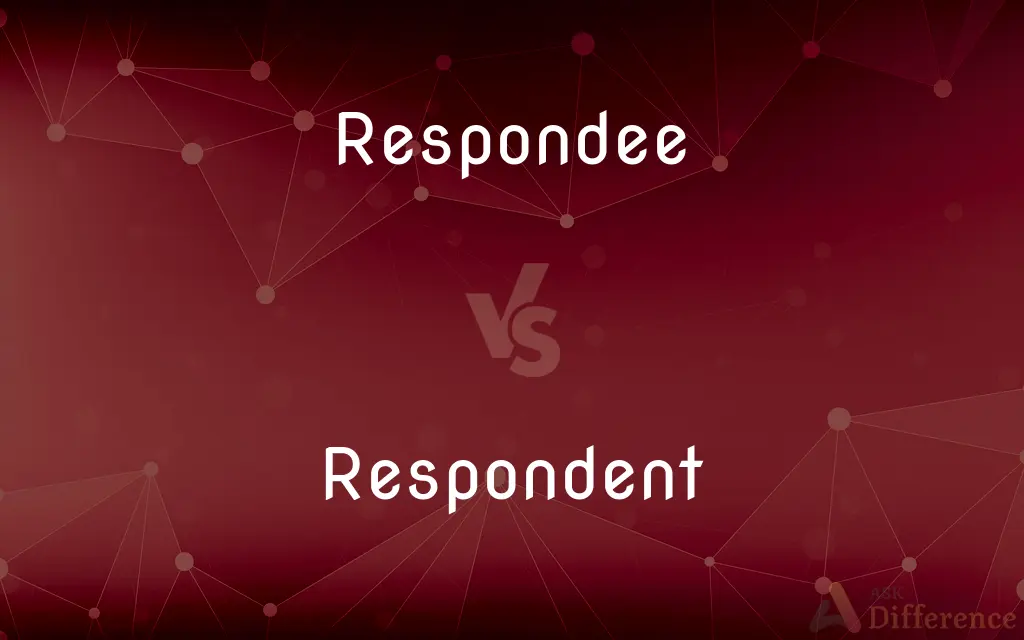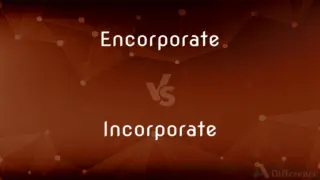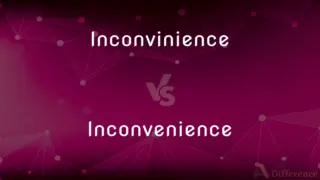Respondee vs. Respondent — Which is Correct Spelling?
Edited by Fiza Rafique — By Maham Liaqat — Updated on April 16, 2024
Respondee is the incorrect spelling of respondent, who is a person who replies or responds.

Table of Contents
Which is correct: Respondee or Respondent
How to spell Respondent?

Respondee
Incorrect Spelling

Respondent
Correct Spelling
ADVERTISEMENT
Key Differences
The correct form mirrors other English words ending in "-ent" that indicate an entity's role or characteristic.
Remember that "respondent" relates to someone who responds, thus it includes the word "respond."
"Respondee" adds an unnecessary extra "e" that isn't typically used in English person descriptors.
Phonetically, "respondent" sounds as it is spelled, emphasizing the "-dent" at the end, unlike the misleading "-dee."
The suffix "-ent" is common in English to denote a person involved in an action, like in "president."
ADVERTISEMENT
How Do You Spell Respondent Correctly?
Incorrect: During the trial, the respondee seemed very nervous.
Correct: During the trial, the respondent seemed very nervous.
Incorrect: Can you send the survey results to the respondee?
Correct: Can you send the survey results to the respondent?
Incorrect: The respondee has the right to hire a lawyer.
Correct: The respondent has the right to hire a lawyer.
Incorrect: Is the respondee required to submit this form?
Correct: Is the respondent required to submit this form?
Respondent Definitions
A person who answers or replies in a legal case.
The respondent in the lawsuit provided all necessary documents on time.
A party who answers a petition in a court.
The court issued a notice to the respondent to appear next Thursday.
A defendant in certain legal systems.
The respondent denied all charges during the hearing.
Someone involved as an answerer in any situation.
The program targeted the respondents with tailored questions to gather in-depth data.
One who replies to a survey or questionnaire.
Each respondent was given a $10 gift card for participating in the study.
A respondent is a person who is called upon to issue a response to a communication made by another. The term is used in legal contexts, in survey methodology, and in psychological conditioning.
A party against whom a petition is filed, especially one in an appeal or a divorce case.
A person who replies to something, especially one supplying information for a questionnaire or responding to an advertisement
Most respondents to our questionnaire considered their practices to be in accordance with current medical guidelines
In the position of a party defending against a petition
The respondent defendant
Replying to something
The respondent firms in the survey
Involving or denoting a response, especially a conditioned reflex, to a specific stimulus.
One who responds.
(Law) The defending party in certain legal proceedings, as in a case brought by petition.
Giving or given as an answer; responsive.
(Law) Of or being a respondent in a proceeding.
One who responds; one who replies.
(law) A defendant, especially in a case instituted by a petition or in appellate and divorce proceedings.
A person replying to a questionnaire.
Disposed or expected to respond; answering; according; corresponding.
One who responds. It corresponds in general to defendant.
The codefendant (especially in a divorce proceeding) who is accused of adultery with the corespondent
Someone who responds
Replying;
An answering glance
An answering smile
Respondent Meaning in a Sentence
As a respondent, he provided detailed answers to the interviewer.
The respondent can appeal the decision if dissatisfied.
The respondent must file an answer within 30 days.
She was selected as a respondent in the consumer feedback survey.
The teacher asked for one respondent from each group to present their findings.
Every respondent had a different view about the new policy.
She served as a respondent at the international conference.
Each respondent received a questionnaire to complete.
He acted as the main respondent in the debate.
The primary respondent in the research study was chosen randomly.
In the survey, every respondent chose more than one option.
The respondent in the focus group shared insightful comments.
Each respondent was given a set of instructions before the experiment.
He was a reluctant respondent, hesitant to share personal details.
The respondent handled the intense questioning very well.
The respondent agreed to follow up after the initial survey.
Respondent Idioms & Phrases
Main respondent
The primary person answering or involved in a response activity.
The main respondent for the feedback session was chosen for her expertise in the topic.
Respondent demographics
Characteristics such as age, sex, or income level of individuals answering a survey.
The study results were analyzed by respondent demographics to understand trends better.
Respondent burden
Refers to the demand placed on individuals who answer survey questions.
The survey was designed to minimize respondent burden by keeping questions straightforward and few.
Respondent fatigue
A condition where respondents become tired and less cooperative due to lengthy or complex surveys.
To avoid respondent fatigue, the researchers limited the survey to ten minutes.
Respondent anonymity
Ensuring that the identities of respondents remain unknown or undisclosed.
Respondent anonymity was guaranteed to encourage honest feedback.
Volunteer respondent
Someone who offers themselves as a respondent without compulsion.
Each volunteer respondent was crucial to the pilot project’s success.
Respondent pool
A group of people from which respondents for a study or survey are chosen.
The respondent pool was diverse, covering various age groups and backgrounds.
Unresponsive respondent
A respondent who does not provide the required feedback or information.
The unresponsive respondent was eventually excluded from the study analysis.
Respondent rights
The legal rights entitled to respondents in research or legal contexts.
The document clearly outlined the respondent rights, including privacy and access to results.
Reluctant respondent
A person who is hesitant or unwilling to provide responses in a survey or research.
The reluctant respondent finally agreed to participate after understanding the purpose of the research.
Lead respondent
The first or principal respondent in a legal case or study.
The lead respondent’s argument was compelling and well-structured.
Targeted respondent
A respondent specifically chosen for research based on certain criteria.
Targeted respondents were selected based on their recent purchase history.
Willing respondent
Someone who is ready and eager to provide information or feedback.
We found that the willing respondents were more likely to give detailed and thoughtful responses.
Anonymous respondent
A respondent whose identity is not known to the researcher or to other respondents.
Each anonymous respondent provided unique insights into the survey topics.
Professional respondent
A person who frequently participates in surveys and studies, often for compensation.
Professional respondents can skew research results due to their experienced understanding of surveys.
Random respondent
A respondent chosen randomly from a larger group.
Random respondents help ensure the study’s results are unbiased and representative.
Potential respondent
A person who could be suitable to respond but has not yet agreed to participate.
The potential respondent was contacted again to confirm their participation.
Survey respondent
An individual who answers questions in a survey.
Each survey respondent was crucial to the success of the market research.
Average respondent
A term used to describe a typical respondent in a survey or study.
The survey results reflected the views of the average respondent.
Key respondent
An important or significant respondent in a study due to their knowledge or position.
Key respondents were given additional questions to capture their expert insights.
Common Curiosities
How do we divide respondent into syllables?
Respondent is divided into syllables as re-spond-ent.
What is a stressed syllable in respondent?
The stressed syllable in "respondent" is the second one: re-spond-ent.
How many syllables are in respondent?
There are three syllables in "respondent."
What is the verb form of respondent?
Respondent does not have a verb form; it is a noun derived from the verb "respond."
What is the root word of respondent?
The root word of "respondent" is "respond."
What is the singular form of respondent?
The singular form is "respondent."
Why is it called respondent?
It is called "respondent" because it refers to someone who responds or answers in a situation.
How is respondent used in a sentence?
A respondent answers questions in a survey or a legal document.
What is the pronunciation of respondent?
Respondent is pronounced as /rɪˈspɒndənt/.
What is the opposite of respondent?
The opposite of respondent could be "questioner" or "inquirer."
Is respondent a noun or adjective?
Respondent is a noun.
Is the respondent term a metaphor?
No, the term "respondent" is not used as a metaphor; it is literal.
Is the word “respondent” a Direct object or an Indirect object?
"Respondent" can be a direct object in a sentence, e.g., I interviewed the respondent.
What part of speech is respondent?
Respondent is a noun.
What is the plural form of respondent?
The plural form is "respondents."
Is respondent a vowel or consonant?
The word "respondent" starts with a consonant.
Is the word respondent imperative?
No, respondent is not an imperative; it is a noun.
Which determiner is used with respondent?
Determiners like "the", "a", and "each" are commonly used with "respondent."
Is respondent a collective noun?
No, respondent is not a collective noun.
Which preposition is used with respondent?
Common prepositions used with "respondent" include "in" and "to."
Which article is used with respondent?
The articles "the" or "a" are used with "respondent," depending on whether the context is specific or general.
What is another term for respondent?
Another term for respondent could be "answerer" or "replier."
Is respondent a negative or positive word?
Respondent is a neutral word; it is neither inherently negative nor positive.
Which vowel is used before respondent?
Typically, vowels like "a" or "the" are used before "respondent" depending on the context.
Which conjunction is used with respondent?
Conjunctions like "and" and "or" are used with "respondent" in lists or comparisons.
Is respondent an adverb?
No, respondent is not an adverb.
Is respondent an abstract noun?
No, respondent is not an abstract noun; it refers to a tangible participant.
Is respondent a countable noun?
Yes, respondent is a countable noun.
Is the word respondent Gerund?
No, respondent is not a gerund; it is a simple noun.
Share Your Discovery

Previous Comparison
Threw vs. Throwed
Next Comparison
Savvy vs. SavyAuthor Spotlight
Written by
Maham LiaqatEdited by
Fiza RafiqueFiza Rafique is a skilled content writer at AskDifference.com, where she meticulously refines and enhances written pieces. Drawing from her vast editorial expertise, Fiza ensures clarity, accuracy, and precision in every article. Passionate about language, she continually seeks to elevate the quality of content for readers worldwide.











































